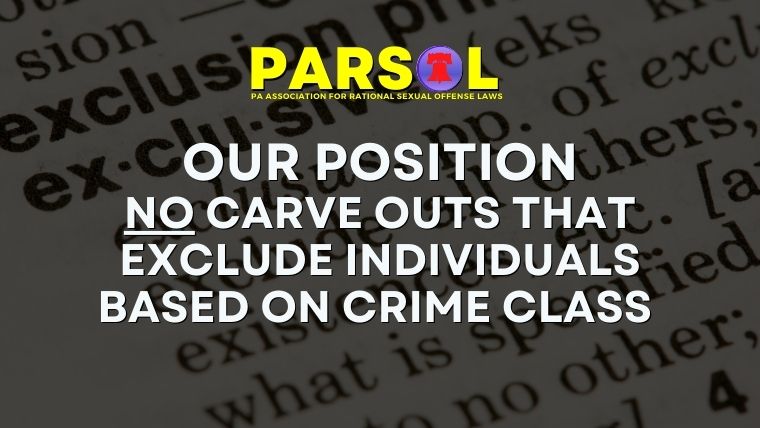With the lowest recidivism rate of any other crime classification, exclusions of persons with crimes of a sexual nature in public policy and/or legislative action is unfair and unjust. Legislators must advocate against/amend legislation containing carveouts that exclude persons with crimes of a sexual nature from programs that enhance their ability to succeed.
The Prison Policy Initiative recently released a report on carveouts stating, “Almost all major criminal legal system reforms in the last 20 years have excluded people charged with or convicted of violent or sex-related offenses.”
Carving out certain charges from discretionary programs actually removes decision-makers’ discretion rather than empowering them to make nuanced decisions.
If we intend to eventually make a certain reform available to people regardless of their charge, the best approach is to make as many people as possible eligible for the reform at the same time. Reforming in stages, starting with the people society is least biased against (those with lower level offenses) increases the likelihood that people with serious charges will be forever left behind.
- Recent Examples:
- Act 44 of 2023 is a major probation reform bill that minimizes punishments for technical probation violations and allows judges to shorten probation time for good behavior or for completing certain programs.
- It should be noted that a recent study by the PA Commission on Crime and Delinquency showed that reentrants with crimes involving child sexual abuse materials had an extremely low 4.3% reoccurrence rate and that 56% of rearrests were due to registry-related technical violations.
- Terminology Clarification: The reoccurrence rate differs from the recidivism rate by only including sexual offenses or sex offense registry-related reasons.
- House Bill 1678 of this session allows the PA parole board to consider people who are proactively participating in educational, trade, and treatment programs sooner and to actively consider the attainment of earned vocational training and education credit in parole decisions.
- Sadly, both of these bills reference the registry law and excludes/disqualifies based on: ‘an offense listed under Subchapter H (relating to registration of sexual offenders) or I (relating to continued registration of sexual offenders).’
- Act 44 of 2023 is a major probation reform bill that minimizes punishments for technical probation violations and allows judges to shorten probation time for good behavior or for completing certain programs.
